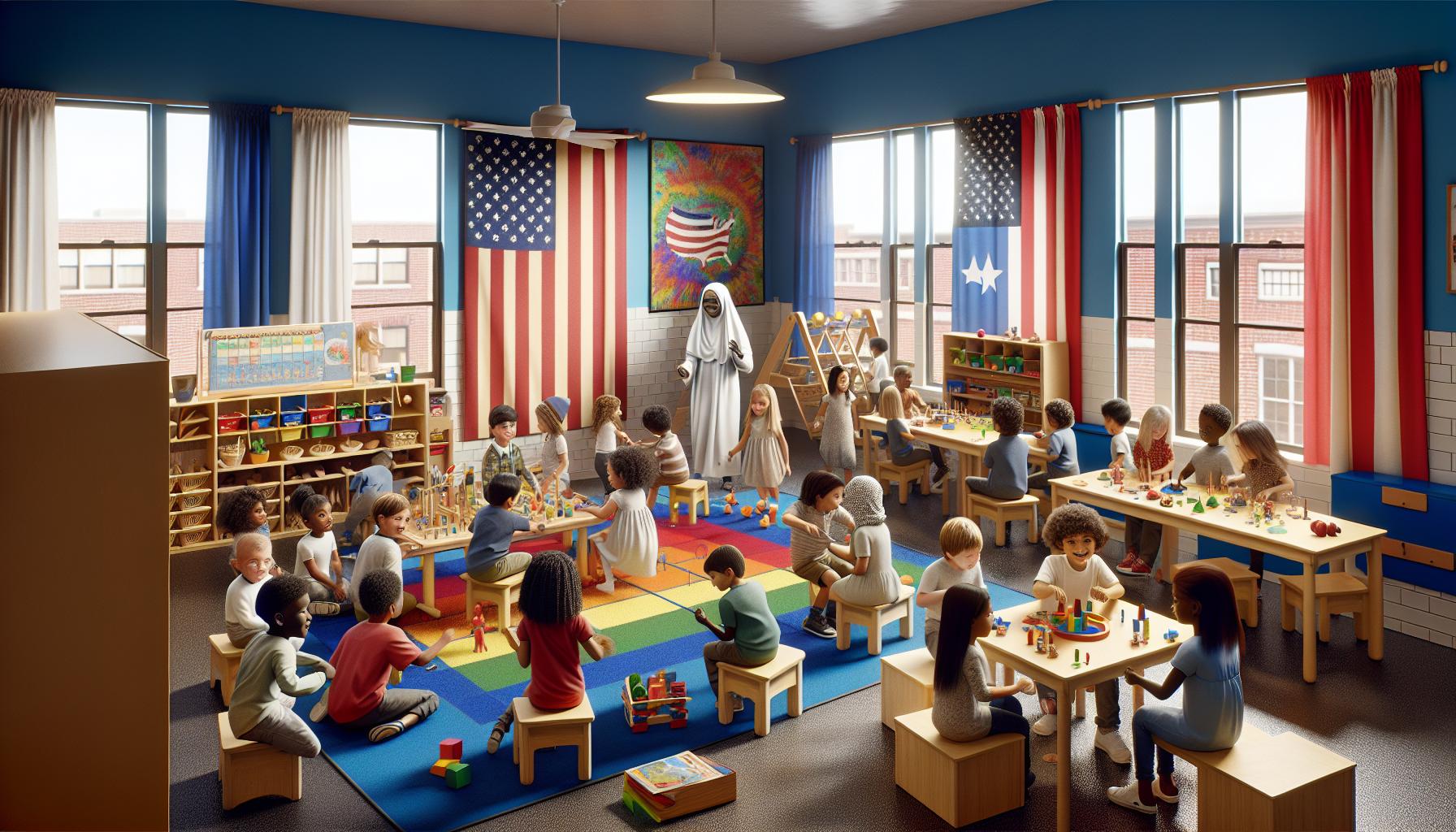Child development schools play a crucial role in shaping the early years of a child’s life. These institutions focus on fostering essential skills and nurturing emotional growth, laying a solid foundation for future learning. Parents often seek environments that prioritize holistic development, blending academics with social and emotional learning.
In today’s fast-paced world, understanding the significance of child development schools is more important than ever. They offer specialized programs designed to cater to the unique needs of young learners, ensuring they thrive both academically and personally. As awareness grows, so does the demand for quality education that emphasizes the importance of early childhood development.
Key Takeaways
- Holistic Development: Child development schools prioritize a balanced focus on cognitive, social, and emotional growth, creating a strong foundation for lifelong learning.
- Diverse Educational Philosophies: Different approaches such as Montessori, Waldorf, and Reggio Emilia offer unique methods tailored to individual learning styles and interests.
- Smaller Class Sizes: These schools typically feature smaller class sizes, allowing for personalized attention from educators and a nurturing environment that fosters strong relationships.
- Integration of Social-Emotional Learning: Curricula incorporate social and emotional education, fostering critical life skills like teamwork, communication, and self-regulation crucial for future success.
- Active Parental Involvement: Engaging families in the educational process strengthens the connection between home and school, enhancing children’s learning experiences.
- Evaluative Factors for Choosing a School: Parents should consider the school’s educational philosophy, curriculum content, teacher qualifications, class size, facilities, and location to ensure the best fit for their child’s needs.
Child Development Schools
Child development schools focus on nurturing children’s cognitive, social, emotional, and physical growth during their formative years. These institutions offer specialized programs tailored to the unique needs of young learners, ensuring a foundation that promotes lifelong learning and adaptability.
Child development schools typically incorporate various pedagogical approaches, such as Montessori, Waldorf, or Reggio Emilia. Each method emphasizes hands-on learning, creativity, and social interaction, allowing children to explore their interests and develop critical thinking skills.
Curricula in child development schools balance academic learning with social and emotional education. Core subjects like literacy, mathematics, and science integrate seamlessly with activities promoting teamwork, communication, and self-regulation. By fostering essential life skills, these schools prepare children for future academic environments and real-world challenges.
Class sizes in child development schools tend to be smaller, enabling personalized attention from educators. This environment supports the development of strong relationships between teachers and students, encouraging a sense of security and belonging. Fostering a nurturing atmosphere enhances children’s emotional intelligence and social competence.
The increasing focus on early childhood education highlights the importance of child development schools. Research demonstrates that quality early education significantly impacts children’s long-term academic achievement and well-being. Parents increasingly recognize the value of these institutions in providing a well-rounded educational experience that prepares children for success.
Importance Of Child Development Schools

Child development schools play a significant role in nurturing children’s overall growth and setting a strong foundation for future learning. These institutions provide structured environments that support social and emotional development alongside cognitive growth.
Social Development
Child development schools prioritize social skills through interactive activities. Children engage in group projects, cooperative games, and peer discussions that enhance teamwork abilities. These experiences encourage effective communication and conflict resolution. Regular collaboration instills a sense of community, fostering friendships and easing transition into formal schooling. Additionally, educators model positive social behaviors, guiding children in understanding empathy, sharing, and respecting differences.
Emotional Development
Child development schools support emotional well-being by creating safe spaces for expression. Children learn to identify and articulate their feelings through age-appropriate activities, such as storytelling and role-playing. These practices cultivate emotional intelligence, equipping them to understand their emotions and those of others. Educators also introduce strategies for self-regulation, teaching methods to cope with stress and frustrations. This focus on emotional development lays the groundwork for resilience, enhancing children’s ability to navigate future challenges.
Types Of Child Development Schools

Child development schools encompass various educational philosophies, each designed to support children’s growth in different ways. The following types highlight distinctive approaches to early childhood education.
Montessori Schools
Montessori schools emphasize child-centered learning through hands-on activities. Teachers observe and guide students rather than instructing them directly. This method encourages autonomy, allowing children to choose their learning paths and engage with materials at their own pace. The classroom environment features multi-age groups, promoting peer learning and collaboration. Key components include practical life skills, sensory experiences, and individualized learning plans.
Waldorf Schools
Waldorf schools focus on nurturing creativity and imagination through a holistic curriculum. They integrate art, music, and storytelling into everyday lessons. The approach prioritizes experiential learning, allowing children to engage with nature and develop social skills. Teachers employ a rhythmical structure, providing stability and predictability. As children progress, the curriculum evolves to include more academic concepts, fostering intellectual and emotional development.
Reggio Emilia Approach
The Reggio Emilia approach places emphasis on community, collaboration, and self-expression. This method encourages children to explore their ideas and interests through projects and inquiries. Teachers act as facilitators, providing resources and support while valuing children’s perspectives. Documentation of children’s work and progress is central to this approach, enabling reflection and enhancing parental involvement. The learning environment is carefully designed to inspire curiosity and creativity.
Choosing The Right Child Development School

Selecting the appropriate child development school significantly impacts a child’s early growth and learning. Parents must carefully evaluate various factors and ask pertinent questions to ensure the best fit for their child’s needs.
Factors To Consider
- Educational Philosophy: Understand the educational approaches (e.g., Montessori, Waldorf, Reggio Emilia) and determine which aligns with the family’s values and the child’s learning style.
- Curriculum Content: Examine the curriculum’s balance of academics and social-emotional learning. Ensure it promotes critical thinking and fosters creativity through interactive experiences.
- Class Size: Investigate class sizes. Smaller class sizes offer personalized attention, enhancing relationships between educators and students.
- Teacher Qualifications: Research the qualifications and experience of the teaching staff. Well-trained educators contribute to a nurturing and effective learning environment.
- Facilities and Resources: Assess the physical environment and resources available. Safe, engaging spaces with ample learning materials support children’s exploration and development.
- Parental Involvement: Review the opportunities for parental engagement in the school community. Strong partnerships between families and schools enrich children’s learning experiences.
- Location and Accessibility: Consider the school’s proximity to home or work. Convenient access makes daily routines easier for families.
- What is the school’s educational philosophy, and how does it impact learning?
- How does the school integrate social-emotional learning into the curriculum?
- What are the average class sizes, and how are they structured?
- What qualifications and ongoing training do teachers receive?
- How does the school ensure the safety and engagement of the learning environment?
- What role do parents play in the school community and decision-making processes?
- What support systems are in place for children with varying needs or challenges?
Evaluating these factors and asking crucial questions enables parents to choose the right child development school that supports their child’s overall growth and development.
Child development schools play a crucial role in shaping the early experiences of young learners. By prioritizing a holistic approach that balances academic and emotional growth, these institutions lay the groundwork for future success. The diverse educational philosophies such as Montessori, Waldorf, and Reggio Emilia offer unique pathways for children to explore their interests and develop essential skills.
As parents navigate the process of selecting the right school, understanding the importance of social-emotional learning and personalized attention becomes vital. Ultimately, choosing a child development school that aligns with a child’s individual needs can significantly influence their overall growth and readiness for the challenges ahead. Investing in quality early education is an investment in a child’s future.